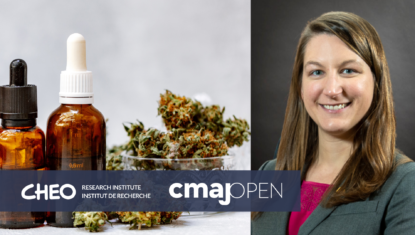The legalization of cannabis in Canada has opened up a new area of research. Or scientific teams are investigating the benefits of different components of cannabis, through the careful lens of youth care.
Related News
-

08/02/2022
Cannabis-related emergency department visits by youth increased five-fold in Ontario between 2003 and 2017
-

10/08/2020
Cannabis use in pregnancy linked to increased risk of preterm birth
-

01/05/2020
Pan-Canadian network to investigate cannabis use in pregnancy and neurodevelopmental outcomes in children.
Research Projects
-
Impacts of medical and non-medical cannabis on the health of older adults: Findings from a scoping review of the literature
17/02/2023
The effects of medical cannabis are inconsistent within specific patient conditions. For older adults, generally, the available evidence suggests cannabis use may be associated with greater frequencies of mental health issues, substance use, and acute healthcare use, and the benefit-to-risk ratio is unclear. Studies with a balanced assessment of benefits and harms may guide appropriate public health messaging to balance the marketing pressures of cannabis to older adults.
-
Cannabis Use in Pregnancy and Downstream effects on maternal and infant health (CUPiD): a protocol for a birth cohort pilot study
12/12/2022
Cannabis is a widely used drug in developed and low/middle-income countries, with up to 1 in 10 individuals reporting past-year use in many countries.1 2 The prevalence of cannabis use in Canada has increased since 2011 due to increased social acceptability, accessibility and availability.3 Canada is among multiple countries that have legalised cannabis for any purpose (ie, medicinal and/or recreational purposes). In 2020, it was reported that approximately 20% of Canadians older than 15 years of age consumed cannabis, increasing from a prevalence of 14% in 2018 before legalisation.4 Notably, the prevalence of cannabis use in pregnancy has increased, and it is the second most commonly used substance in pregnancy, behind tobacco.5–9 Legalising cannabis and its increased use in many populations, including pregnant individuals, may contribute to a decreased perception of its harm.2 10
-
Cyberbullying involvement, parental support, and cannabis use among adolescents
13/08/2022
Our results showed that cyberbullying involvement in any role (i.e., cyberbullying victim only, cyberbullying perpetrator only, or cyberbullying perpetrator-victim) was associated with greater odds of cannabis use after adjusting for important covariates. Results further indicated that higher parental support was associated with lower odds of cannabis use in a dose-response fashion. Higher parental support was also associated with a lower risk of cyberbullying involvement.
-
Potential Benefit of Add-on Δ9-Tetrahydrocannabinol in Pediatric Drug-Resistant Epilepsy: A Case Series
29/06/2021
Based on our experiences and reports in the literature, we propose that, in patients who fail management with an initial trial of high-dose CBD-focused therapy, there may be a role for add-on THC-focused formulations.
-
Maternal cannabis use in pregnancy and child neurodevelopmental outcomes
10/08/2020
With the legalization of recreational cannabis in many jurisdictions, there is concern about potentially adverse childhood outcomes related to prenatal exposure.
-
Cannabis treatment in children with epilepsy: Practices of Canadian neurologists
04/03/2020
The majority of Canadian pediatric neurologists consider using cannabis as a treatment for epilepsy in children. With many gaps in evidence and high patient-driven demand for cannabis therapy, this survey provides immediate information from the “wisdom of the crowd,” to aid neurologists until further evidence is available.
-
Cannabis use for therapeutic purposes by children and youth at a tertiary teaching hospital in Canada: A retrospective chart review
02/03/2020
Medically supervised cannabis use occurred most often in patients with intractable or refractory seizures. According to these data, seizure response is variable, and initial decreases may be transient for pediatric patients using cannabis. To ensure greater consistency and rigour in the conduct of prospective research and thus to generate better-quality research on the therapeutic effects of medical cannabis, development of a standardized care record is needed.
-
Association Between Self-reported Prenatal Cannabis Use and Maternal, Perinatal, and Neonatal Outcomes
18/06/2019
Among pregnant women in Ontario, Canada, reported cannabis use was significantly associated with an increased risk of preterm birth.
-
Trends and correlates of cannabis use in pregnancy: a population-based study in Ontario, Canada from 2012 to 2017
01/11/2018
Cannabis use in pregnancy has increased since 2012 in Ontario and was reported in about 2% of pregnancies in 2017.
Researchers
-
Melanie Bechard
Investigator, CHEO Research Institute
-
Christina Cantin
Scientist CHEO, Research Institute
-
Jean-Philippe Chaput
Senior Scientist, CHEO Research Institute
-
Daniel Corsi
Scientist, CHEO Research Institute
-
Dawn Davies
Investigator, CHEO Research Institute
-
Deshayne Fell
Affiliate Investigator, CHEO Research Institute
-
Amy Porath
Investigator, CHEO Research Institute
-
Erick Sell
Investigator, CHEO Research Institute
-
Christina Vadeboncoeur
Investigator, CHEO Research Institute
-
Private: Régis Vaillancourt
Senior Scientist, CHEO Research Institute
-
Richard Webster
Investigator, CHEO Research Institute











